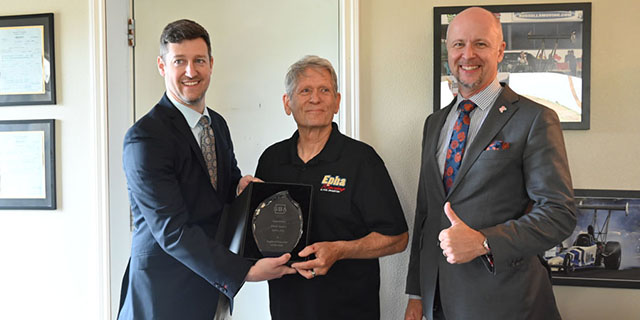Learning to keep bees
Published 1:04 pm Tuesday, July 2, 2013

- <p>Beekeepers Steve Sweet, left, and Frank Grover, both of Boise, Idaho, check a bee hive for a queen bee on Saturday at Vazza Farms in Hermiston.</p>
Wearing nothing but a long-sleeved shirt to cover his arms and using a smoker to avoid being stung, beekeeping student Steve Sweet reached into a bee hive with his bare hands to pull out a frame containing hundreds of bees during a beekeeping class at Vazza Farms Saturday.
Sweet, Boise, was one of 14 novice and experienced beekeepers who braved the high temperatures to inspect bee hives to verify that there was at least one queen bee per hive.
The students used a smoker to mask the bees chemical communication and alarm system, which reduced their likelihood of getting stung.
They dont want to sting you, Sweet said. They only sting for defensive reasons.
The sunshine and harsh temperatures, reaching more than 100 degrees, were ideal for the class because the heat helped calm the bees. The heat also leads to a greater production of honey, Sweet said.
The Oregon Master Beekeepers Program class was one of a series that Vazza Farms offers from January to August for people who are interested in keeping bees.
In the class, students learn about beekeeping through hands-on activities where they work with live bees and learn the process of keeping hives and making honey. Hermistons Vazza Farms beekeeper Jan Lohman teaches the classes and acts as a mentor for her students.
Lohman said the Oregon Master Beekeepers program is the only program in the country to require mentors for apprentice beekeepers.
I think it is very important to have a mentor, Lohman said. It is important to have someone to call to work out a problem.
Lohman said many people who start out in beekeeping may develop a problem with their hives and will just let them die. She said she hopes to avoid that scenario with the classes.
Saturday, Lohman had the students inspect each frame to see if the queen bee laid eggs. The eggs appeared as miniscule white dots in the center of each honeycomb cell on the frame. She said eggs are evidence that the hive has a queen, which is necessary for the hive to survive. Only three of the 64 hives were missing a queen on Saturday, Lohman said.
After working with the bees, all students returned to a warehouse where Lohman presented a slide show on topics ranging from the basics of keeping a bee hive alive to the types of diseases that beekeepers have to be aware of and treat.
Lohman said the students range from having no beekeeping experience to those, like Sweet, who have more than 40 years.
Sweet said despite his experience, he and five other beekeepers travel from the Boise area to take lessons from Lohman.
Sweet said he started beekeeping as a hobby and now he has more than two dozen production hives. With the help of the classes, he said he wants to expand his honey production business and maybe create a beekeeping program for the state of Idaho.
He said the Vazza Farms operation is not like others, in that it is smaller but of higher quality.
Sweet said even with the small operation, Vazza Farms is still able to produce the same amount of honey because of the care put into each hive and an attention to detail.
Vazza Farms maintains 2,264 bee colonies, though 80 percent of those bee colonies are used for pollination rather than honey production, Lohman said.
They still produce a fair amount of honey as a by-product, however, she said, adding Vazza Farms may produce approximately several hundred barrels of honey per year.
Throughout the class, many beekeeping students noted the cleanliness of the hives.
This here is the cleanest operation you will find, 22-year Boise beekeeper Frank Grover said. I have learned something every time Ive come out here.
Lohman said she and her partner, Vince Vazza, take great care to maximize output from every bee hive at their facility.
Every time we come out here we have at least one problem, she said. We fix every problem to maximize the hive. We strive to be a good pollinating unit all year long. Our losses are less than the big production beekeepers.
Lohman said larger productions dont have the manpower to fix every hive and will abandon those with problems.
I think it is because we are smaller, she said. If we had twice as many bees, it would be twice as much time.
For more information about the beekeeping program, visit http://extension.oregonstate.edu/mb/.





